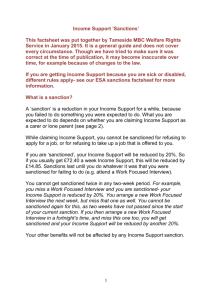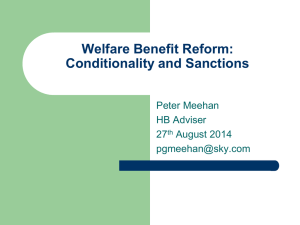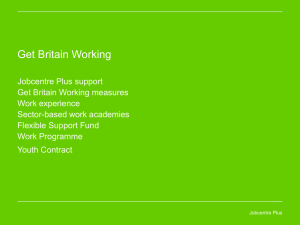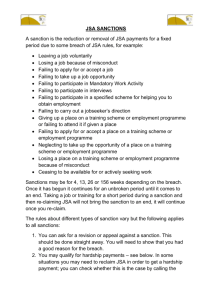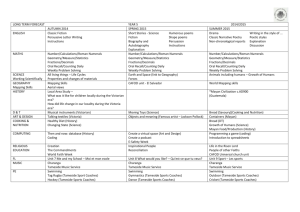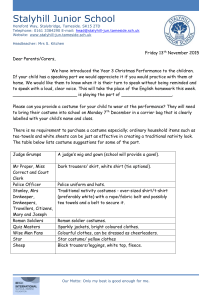Jobseekers Allowance (JSA) `Sanctions`
advertisement
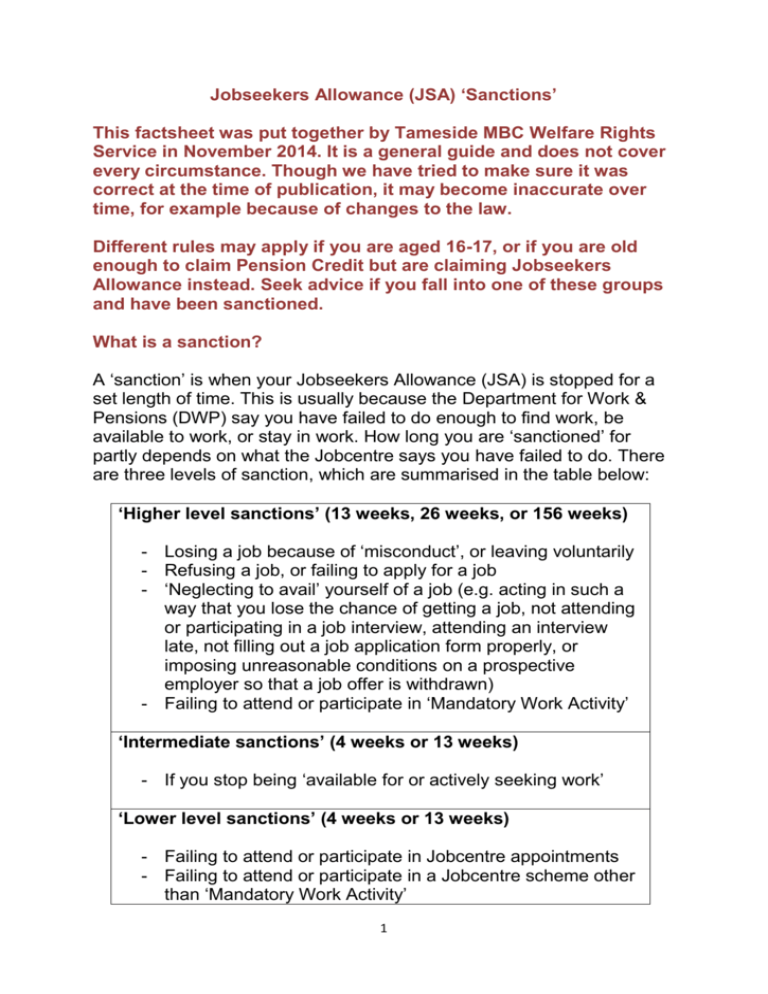
Jobseekers Allowance (JSA) ‘Sanctions’ This factsheet was put together by Tameside MBC Welfare Rights Service in November 2014. It is a general guide and does not cover every circumstance. Though we have tried to make sure it was correct at the time of publication, it may become inaccurate over time, for example because of changes to the law. Different rules may apply if you are aged 16-17, or if you are old enough to claim Pension Credit but are claiming Jobseekers Allowance instead. Seek advice if you fall into one of these groups and have been sanctioned. What is a sanction? A ‘sanction’ is when your Jobseekers Allowance (JSA) is stopped for a set length of time. This is usually because the Department for Work & Pensions (DWP) say you have failed to do enough to find work, be available to work, or stay in work. How long you are ‘sanctioned’ for partly depends on what the Jobcentre says you have failed to do. There are three levels of sanction, which are summarised in the table below: ‘Higher level sanctions’ (13 weeks, 26 weeks, or 156 weeks) - Losing a job because of ‘misconduct’, or leaving voluntarily - Refusing a job, or failing to apply for a job - ‘Neglecting to avail’ yourself of a job (e.g. acting in such a way that you lose the chance of getting a job, not attending or participating in a job interview, attending an interview late, not filling out a job application form properly, or imposing unreasonable conditions on a prospective employer so that a job offer is withdrawn) - Failing to attend or participate in ‘Mandatory Work Activity’ ‘Intermediate sanctions’ (4 weeks or 13 weeks) - If you stop being ‘available for or actively seeking work’ ‘Lower level sanctions’ (4 weeks or 13 weeks) - Failing to attend or participate in Jobcentre appointments - Failing to attend or participate in a Jobcentre scheme other than ‘Mandatory Work Activity’ 1 - Failing to carry out a ‘Jobseeker Direction’ - Giving up a place on a training scheme or employment programme, or failing to attend if given a place - Failing to apply for or accept a place on a training scheme or employment programme - Losing a place on a training scheme or employment programme through misconduct - ‘Neglecting to avail’ yourself of a place on a training scheme or employment programme The length of a sanction partly depends on how many sanctions you have had in the last 52 weeks. For example, you may only get ‘sanctioned’ for 4 weeks the first time you miss a Jobcentre appointment. But if you miss a second Jobcentre appointment in the next 52 weeks, you risk then getting ‘sanctioned’ for 13 weeks. It is important to challenge every sanction which you believe to be wrong, to avoid longer, more severe sanctions in the future (see pages 5-6). If you are claiming JSA with a partner, but only one of you is sanctioned, your JSA will be reduced for the length of the sanction (rather than being stopped altogether). How can I avoid being ‘sanctioned’? When you claim JSA, you’ll be asked to agree and sign a Claimant Commitment that sets out the kind of work you agree to look for, and the steps you agree to take to look for work. Try to make sure your Claimant Commitment does not include anything you will struggle with (e.g. because you are a parent responsible for a young child, a carer, a volunteer, or because you have a health condition or disability). If there is anything included on it that you know you cannot do, you should explain this to the Jobcentre adviser. You can sign a Claimant Commitment you disagree with, then ask for any changes you want to make to be looked at by a DWP ‘decision maker’. You should keep a written record of what you have done to look for work. If you do not give your Jobcentre adviser access to your on-line ‘Universal Jobmatch’ account, you will have to provide other evidence of what you have done to look for work at every Jobcentre appointment. If you are not carrying out everything in your Claimant Commitment, the Jobcentre will refer you to a ‘decision maker’. You need to demonstrate 2 why you have not been doing everything, and show ‘good cause’. If you cannot show this, you may be ‘sanctioned’. It is not always clearly defined what is counted as ‘good cause’. Bear in mind that you are expected to prioritise looking for work and attending Jobcentre appointments, except in very exceptional circumstances. If you know you will be late for a Jobcentre appointment, or if you cannot attend at all, let the Jobcentre know in advance. Give your reasons, and keep a record of who you spoke to and when. If you are told your claim has been suspended because of ‘a query about your entitlement’, this means you may be ‘sanctioned’. You should contact your local Jobcentre immediately. Once you know what the Jobcentre is saying you have failed to do, explain your reasons for not doing it. I’ve been ‘sanctioned’- what do I do? If your JSA is stopped because you have been sanctioned, there are a few things you need to do. Firstly, you need to keep signing-on, and doing all the things you have agreed to do in your Claimant Commitment, or else you will risk getting another (even longer) sanction. Also, if you are getting Housing Benefit or Council Tax Support, you need to let Tameside MBC know you have been ‘sanctioned’ by ringing 0161 342 8355. When you are ‘sanctioned’, Tameside MBC may suspend your Housing Benefit and Council Tax Support until you contact them. Therefore if you do not contact them, you could get into arrears with your rent, which may then put you at risk of eviction. If you know you are going to struggle with no income, you can ask the Jobcentre for an application form for Hardship Payments. Fill out this form and get it back to them as soon as possible. On the form, say as much as you can about why you cannot afford basic things like food and heating for you and your family. For single people, Hardship Payments are 60% of what you would have got on JSA (80% if you are pregnant or seriously ill). 3 If you are in one of the following groups of people, and qualify for a Hardship Payment, this can be paid from the first day of your sanction: - Pregnant women - Parents looking after a child - People with a chronic health condition which has lasted or is likely to last for at least 26 weeks. - Young people aged under 21 who used to be ‘looked-after’ by a local authority (i.e. who were in care as a child). - Carers of someone who is claiming Attendance Allowance, Personal Independence Payment (daily living component), Disability Living Allowance (higher or middle rate care), or Armed Forces Independence Payment. - 16-17 year-olds. If neither you nor your partner fit into one of these groups, and you qualify for a Hardship Payment, this is paid from the 15th day of your sanction. If you are turned down for Hardship Payments, you can re-apply later. The longer your sanction lasts, the more likely it is that you will be seen to be facing hardship. You can also challenge the decision to refuse you Hardship Payments by following the process on pages 5-6 of this factsheet. Food banks provide free food to people in a crisis. For information on food banks in Tameside, check out http://tamesidefoodbanks.madewithjam.org/. You may need to be referred by an organisation like Tameside Citizens Advice Bureau to get a food parcel. How do I challenge a sanction? This information relates to challenging DWP benefits decisions made after 28th October 2013. When you challenge a decision to sanction you, you have to say why you disagree with it. If you are ‘sanctioned’ because the Jobcentre wrongly says that you did not do something, you need to show evidence that you did it. If you had ‘good cause’ for failing to do something, explain why, and provide evidence of this if possible. 4 Evidence could be copies of letters, printouts of emails, copies of your jobs diary, or the dates and times of any telephone calls. When posting evidence to the DWP, remember to keep copies for yourself. 1. Contact the DWP If your Jobseekers Allowance has stopped and you don’t know why, ring the DWP on 0345 608 8545 (textphone 0345 605 5255) for an explanation. You may have been sanctioned, or there may be another reason why your JSA has stopped. Record the date and time of your call, and the name of the person you spoke to. 2. Mandatory Reconsideration Once you have a letter from the DWP saying you have been ‘sanctioned’, you can ask them to look at their decision again if you disagree with it. This is called ‘mandatory reconsideration’. It is best to ask for a ‘mandatory reconsideration’ in writing: post your letter to the address given on the DWP letter, keep a photocopy of the letter you send, and get proof of postage. You can also ask for a ‘mandatory reconsideration’ by ringing 0345 608 8545 (textphone 0345 605 5255): record the date and time of your call, and the name of the person you spoke to. You must ask for a ‘mandatory reconsideration’ within 1 month of the date on the DWP letter. If you are doing this in writing, your letter needs to get to the DWP before the 1 month deadline. If you have missed the deadline, you may lose the right to appeal the decision, so get specialist advice as soon as possible. You may be contacted by a DWP decision-maker for any further evidence to support your request for a ‘mandatory reconsideration’. 3. Appeal Once the DWP have looked at their decision again, you will get a ‘mandatory reconsideration notice’ letter telling you whether or not they have changed their decision to sanction you. If the decision is not overturned and you still disagree with it, you can now appeal directly to an independent tribunal, which has the power to overturn the DWP’s decision. To appeal, you need to use form SSCS1, which is available at http://www.justice.gov.uk/downloads/forms/tribunals/sscs/sscs1.pdf. 5 You need to send the completed form, along with the ‘mandatory reconsideration notice’ letter, to HM Courts & Tribunals Service. This needs to be received by HM Courts & Tribunals Service within 30 days of the date on the ‘mandatory reconsideration notice’ letter. A late request can be made in very exceptional circumstances, but seek specialist advice first. It is best to get advice before filling out form SSCS1. If you tick the box on the form saying you want to attend your hearing, a specialist adviser may be able to come along with you to the hearing. An adviser may be able to help you prepare for the hearing, even if they can’t come to it with you. After the hearing, you can only appeal the tribunal’s decision if it made a mistake in how it interpreted the law. You should always get specialist advice if you are thinking about appealing a tribunal’s decision. Further information Advice Tameside www.advicetameside.org.uk/ Tameside MBC Welfare Rights www.tameside.gov.uk/benefits/welfarerights Turn2Us www.turn2us.org.uk Benefits And Work www.benefitsandwork.co.uk 6 Local advice For help with ‘mandatory reconsiderations’, hardship payments and food banks. Tameside Citizens Advice Bureau offers information and advice on a whole range of problems at their drop-in (09:30-12:30 every weekday) at Ashton Customer Services (Tameside MBC, Council Offices, Clarence Arcade Stamford Street, Ashton-Under-Lyne, OL6 7PT). For specialist advice, including help challenging a benefit decision: Tameside MBC Welfare Rights Service offers telephone advice on benefits on 0800 0749985 (09:30-12:30, Mondays, Wednesdays and Thursdays). The Welfare Rights Service can provide representation at tribunal hearings, and help you prepare for your hearing. If you are a New Charter tenant, you can get advice and help with your benefits by ringing 0161 3312200. 7
